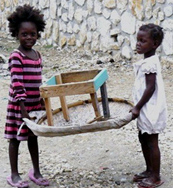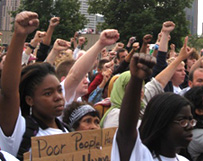
Articles by Beverly Bell


Community and Popular Radio in Haiti Today
Source: Truthout
Sony Esteus, popular radio promoter, at work in his post-earthquake office.(Photo: Roberto (Bear) Guerra)
Sony Esteus is squeezed into an elementary school chair, the kind with the curved piece of wood in front, in a courtyard. Around him are chickens, a fly-swarmed pile of compost, a truck and a tent. Sony runs his laptop off of an extension cord running out a window. The cord and the courtyard are on loan from a nonprofit, and they have formed Sony’s work station since the earthquake’s destruction of his own organization’s building. Sony is director of the Society for Social Mobilization and Communication – SAKS by its Creole acronym – which provides training, technical support, equipment and production to help popular radio stations educate and inform the community.

Grassroots Power and Non-Market Economies
There are primarily two factors behind the current spike in people's mobilization. One is the level of crisis that people around the world are facing, economically and environmentally. Second is the Internet, through which movements have been able to communicate and unite to a degree that is historically unprecedented. Some of the qualitative changes are, now there are people organized across many sectors that have never chosen to step out into the popular movement before.
